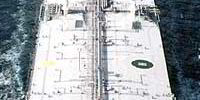The costs associated with meeting the upcoming Water Ballast Management Convention (WBC) could prompt a fresh round of VLCC scrapping, a top shipbroker has said.

Quoting Wartsila Water Solutions Gibson says fitting a VLCC with the required equipment “can currently put an owner back as much as $8m”.
Recent VLCCs sold for demolition have generated returns of around $20m, at the same time the second-hand price for a 15 year old has fallen to around $24m.
Gibson warns that prices are likely to “continue to head south” as the supply of new tonnage goes unabated and charterers show preference for younger tankers.
Another problem will be the huge number of tankers (and indeed other ship types) which will need systems installed says the shipbroker.
The International Chamber of Shipping has suggested that over 20 ships a day will need to have systems installed to meet the convention, which will require all ships be fitted with ballast water management systems by mid 2017.
According to one major class society, at present there are only 17 approved water management systems on the market and concerns have been raised about the availability of equipment for ships with large ballast water requirements.
“Perhaps for many owners this is still too far away to even contemplate what impact and perhaps more importantly, the cost this legislation will have on their operations,” it said.
The exact date of implementation is still unknown, but it is widely expected that the new convention will enter into force in a little over a year
Gibson says that the 30 required IMO member states representing more than a quarter of the world’s tonnage have already signed up.
And it is believed that Panama will shortly add their signature, which will take the requirement well beyond the 35% of the global fleet to force implementation.
“Once the WBC enters into force, owners will be taking a critical look at their survey position and have to decide if the additional expenditure as well as the drydocking/repair costs and more off hire days is worthwhile,” it said.
“However, the tranche of impending regulations may prove to be too tempting if the differential between second-hand and scrap price continues to narrow and we could see a much faster removal of more elderly ladies.”



